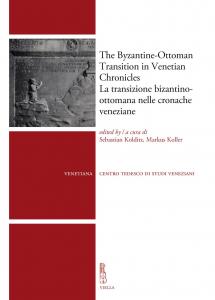The Byzantine-Ottoman Transition in Venetian Chronicles / La transizione bizantino-ottomana nelle cronache veneziane
CODICE: ISBN 8867289179 EAN 9788867289172
AUTORE/CURATORE/ARTISTA :
Edited by/a cura di: Sebastian Kolditz, Markus Koller Contributors/Contributi di: Sebastian Kolditz, Markus Koller, Dorit Raines, Şerban V. Marin, Peter Schreiner, Maria Pia Pedani, Georg Christ, Thierry Ganchou, Sebastian Kolditz, Carlo Campana, Colin Imber, Giorgio Vespignani, Hans Georg Majer
EDITORE/PRODUTTORE : Viella Libreria Editrice
COLLANA/SERIE : Venetiana, 19
DISPONIBILITA': Disponibile
TITOLO/DENOMINAZIONE:
The Byzantine-Ottoman Transition in Venetian Chronicles / La transizione bizantino-ottomana nelle cronache veneziane
PREZZO : EUR 32,00€
CODICE :
ISBN 8867289179
EAN 9788867289172
AUTORE/CURATORE/ARTISTA :
Edited by/a cura di: Sebastian Kolditz, Markus Koller Contributors/Contributi di: Sebastian Kolditz, Markus Koller, Dorit Raines, Şerban V. Marin, Peter Schreiner, Maria Pia Pedani, Georg Christ, Thierry Ganchou, Sebastian Kolditz, Carlo Campana, Colin Imber, Giorgio Vespignani, Hans Georg Majer
EDITORE/PRODUTTORE:
Viella Libreria Editrice
COLLANA/SERIE:
Venetiana, 19
ANNO:
2018
DISPONIBILITA':
Disponibile
CARATTERISTICHE TECNICHE:
328 pages/pagine
Paperback/Brossura
cm 15 x 21
DESCRIZIONE:
Publisher's description:
During the 14th and 15th centuries the Ottoman Empire emerged as the new hegemonial power in the Romania, i.e. the territories that once had formed the core of Byzantium. As a major economic and political agent in this area, Venice and the Venetian elite were thoroughly affected by this transition, and consequently Venetian documents have often been used to elucidate the history of the late Byzantine and early Ottoman epoch. Yet, the repercussion of this change in the numerous works of late medieval Venetian historiography, particularly in the often anonymous chronicles, still awaits systematic exploration.
Against this background, the present collection of papers, that goes back to an international workshop held in 2014, combines both, methodological reflections on the characteristics of the Venetian cronachistica and the use of the information it contains, and a number of individual case-studies reflecting crucial stages of the Byzantine-Ottoman transition.
Commento dell'editore:
Nel XIV e XV secolo, l'Impero Ottomano si andò affermando come nuova potenza egemoniale nella regione che un tempo era stata il nucleo di Bisanzio. Questa transizione interessò anche Venezia e l'élite veneziana in quanto attori politici ed economici di rilievo nell'area. Di conseguenza, i documenti veneziani sono stati spesso utilizzati per illustrare la storia di un'epoca che vide il tramonto dell'Impero bizantino e l'ascesa di quello ottomano. Eppure, le ripercussioni di queste trasformazioni sulla copiosa produzione storiografica tardo-medievale della Serenissima e, in particolare, sulle cronache veneziane spesso anonime, non erano ancora state studiate in modo sistematico.
In tale contesto questo volume, frutto di un workshop internazionale, combina riflessioni metodologiche sulle caratteristiche della cronachistica veneziana e dell'uso delle informazioni in essa contenute e singoli casi di studio che riflettono fasi cruciali della transizione bizantino-ottomana.
Table of Contents/Indice:
Foreword
Prefazione
Sebastian Kolditz, Markus Koller, The Byzantine-Ottoman Transition in Venetian Chronicles. An Introduction
Dorit Raines, Venetian Chronicle Writing: From Factual Compilation to Event Telling
Şerban V. Marin, The Venetian Historical Writing and Its Immobilisms
Peter Schreiner, Gli imperatori bizantini nella cronachistica veneziana
Maria Pia Pedani, Chronicles and Documents: Two Kinds of Sources, One Study
Georg Christ, News from the Aegean: Antonio Morosini Reporting on the Battle of Gallipoli (Early 15th Century)
Thierry Ganchou, Les chroniques vénitiennes et les unions ottomanes des filles de l'empereur byzantin Jean V Palaiologos, Eirènè et Maria (1358 et 1376)
Sebastian Kolditz, The Council of Ferrara-Florence as Reflected in Venetian Chronicles: Preliminary Observations
Carlo Campana, «…per la maggior parte è sottoposta a' Turchi… e sono per il più Greci». Le cronache della Marciana e la Romania
Colin Imber, Fact and Fantasy: Venetian Reports on the Anti-Ottoman Rebellion in Syria, 1520-1521
Giorgio Vespignani, Romània e Romei tra Venezia, Mosca e il Mar Nero dopo la caduta di Costantinopoli (secoli XV-XVI)
Hans Georg Majer, Franz Babinger und die italienischen Quellen zur frühosmanischen Geschichte
Contributors / Gli autori
Index of personal names / Indice dei nomi di persona
Index of places / Indice dei nomi di luogo
GENERE: Libri ,Saggi ,



